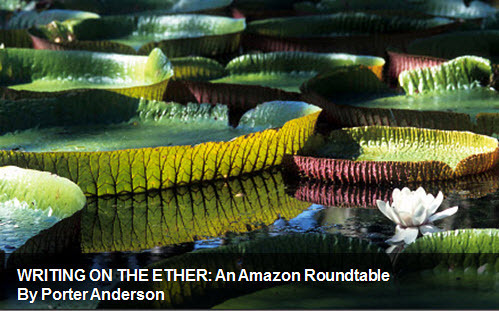WRITING ON THE ETHER: An Amazon Roundtable
Table of Contents
A Marvelous Party
Authorial Viewpoints
The Appeal to the Readership
Universal Agreement Isn’t Needed—Or Wanted
A Marvelous Party
I’ve been to a marvelous party
With Noonoo, and Nada, and Nella.
Noel Coward didn’t turn up. He’s in no condition. But Amazon’s CreateSpace and Kindle Direct Publishing (KDP) did something I saw no other publishing outfit(s) doing at BookExpo America: They hosted a private roundtable of leading self-publishing authors and some of us who cover publishing—not for the purpose of promoting what they do, but to get everyone’s input on how things look.
The resulting session was a marvelous, one-hour, serious but thoroughly pleasant kind of party of shared insights and repartee. I couldn’t have liked it more.
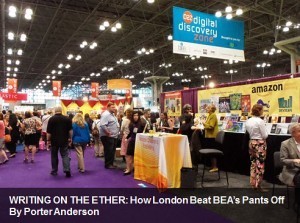 If you’ve missed it so far, you may want to refer to my Ether for Authors column of Monday at Publishing Perspectives.
If you’ve missed it so far, you may want to refer to my Ether for Authors column of Monday at Publishing Perspectives.
How London Beat BEA’s Pants Off looks at the stark difference in how authors were positioned this year at April’s London Book Fair and New York’s BookExpo America, both of them produced by Reed Exhibitions.
To give it to you quickly:
(1) In London, the introduction of an “AuthorLounge”—a physical focus, a spacious pavilion at which Authoright (of New York and London) could program and stage various author-centric events—meant that the writers, fundamental to all publishing, were welcomed as players, as business people in their own right, with a place and purpose in the trade.
(2) By contrast, BEA had no such facility and positioned writers in the old way, as what I’ve termed creatures of publishers—allowed into the Javits largely for the purpose of providing autograph-signing events, a few speeches, some glad-handing in the booths. This decades-old profile of “author” at BEA was seriously and healthily challenged by the cooperative Booth 966 mounted by six “Indie Bestsellers” of a combined eight million copies.
THIS => RT @4fifty1: @ajaxlogos If anything Amazon give indies a better shot at visibility than bricks and mortar bookstores.
— Rebecca Smart (@rebecsmart) June 6, 2013
For my money, you couldn’t have found a more dramatically opposed intent guiding Seattle, when it brought together about a dozen of us for a robust conversation about entrepreneurial authors’ profile in the market today.
No defensiveness: Quite the contrary. Amazon’s soft-spoken, elegant CreateSpace and KDP Vice-President Nader Kabbani, and his Director of Independent Publishing for North America Libby Johnson McKee were there to listen, to take notes, to find out how a trio of key, major-selling authors and their constant media interpreters see things.
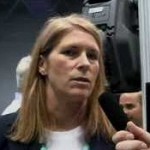
Libby Johnson McKee
McKee had a great observation from 1997, when she began work with Amazon, “right before the company went public.”
My first job was to come to New York and negotiate terms and conditions with publishers. They were very sure that we were going to go out of business quickly, because who could sell books on the Internet? We were all about getting big fast and adding selection. It was this democratization of shopping that attracted me to Amazon. [By 2001] our book business was over a billion dollars…as people were finding the books they loved online.
Incredible video: An impassioned @realjohngreen on why writers still need editors, booksellers and publishers. ow.ly/lLziA
— Colleen Lindsay (@ColleenLindsay) June 6, 2013
When McKee talks quietly of “removing the gatekeepers” and “letting people have their stories be told” and “putting more truths into the world” you begin to hear the human heart of Amazon’s relationship to books and publishing. Her thrill in being made the manager of Amazon Independent Publishing by Kabbani is every bit as clear as the company’s self-published authors’ descriptions of their own excitement.
At Amazon, we always start with the customer and work backward. And in this part of the business, we start with the author and work back from that. Making independent publishing mainstream is what we’re all about.
If you search amazon for a shovel, you can narrow your search by clicking the "digging" option. Or you can buy a non-digging shovel?
— Mark Hoppus (@markhoppus) June 5, 2013
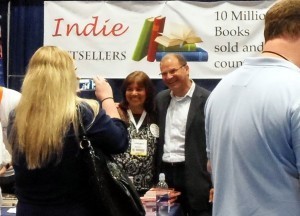
Nader Kabbani, here with 3-million-book-selling self-publishing author Barbara Freethy at the author’s BEA Booth 966
Kabbani is in his ninth year with Amazon. “My first two years were in supply chain, which was very bizarre. My background is in research. I love solving hard problems…problems that have not been solved before.” At the time of the Kindle’s development, Kabbani said:
Traditional publishing was something I’d observed, I love books. I was brought in to turn Amazon from a retailer to a device manufacturer, building the Kindles. Part of my job was to look for a way to fulfill Jeff Bezos’ vision of every book that’s ever been published in any language delivered in sixty seconds. We knew that negotiating with traditional publishers would not be enough.
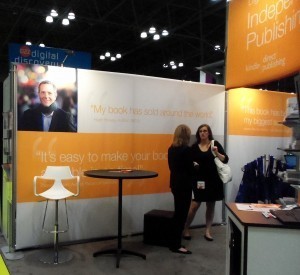
Amazon’s CreateSpace installation at BEA featured author Hugh Howey as a sefl-publishing poster boy
And the Jacob Javits Center had been noisy with the hype and hubris all week of traditional publishers. BEA is a trade show, after all, and promotion is its purpose.
CreateSpace, in fact, had played its part, too, its pavilion’s performance area programmed with presentations about CreateSpace and KDP services and about Goodreads, the recent Amazon acquisition.
But this gathering brought together three of the six entrepreneurial authors of Booth 966—Stephanie Bond, Hugh Howey, and CJ Lyons—with these Amazon executives and publishing-focused bloggers and journalists, all for the purpose of exploring how we all see the state of self-publishing at this point, particularly as it has been enabled in its most serious potentials through Amazon.
When this session’s door closed behind us in one of the downstairs meeting rooms on the northerly end of the Javits complex, the salesmanship, was left outside. Both the authors and a blogger or two had recommendations to make, and they were heard without resistance, in good faith.
Apple trial: Enter Amazon The tenor of the Apple trial changed dramatically when Amazon took the stand. bit.ly/19LoGRH
— Rijanto (@rijantocom) June 6, 2013
And what a remarkable group was around this table. Here were:

Jane Friedman
Jane Friedman, Virginia Quarterly Review’s digital editor, former Writer’s Digest publisher, and my host for the Ether here at JaneFriedman.com. “In a setting like this, I’m taking the perspective of the author-advocate, figuring out how best to advise them, whether they’re fairly new or very well-established.”

Jane Litte
Jane Litte, the attorney who founded the endlessly busy Dear Author site aimed at “Shirtless Men Kissing Beautiful Women” fans, as I call them. Litte told us that last year, her operation moved some $350,000 of merchandise through her site’s Amazon Affiliate program. Not that I’ve ever said romance is anything but successful. But $350,000 of material traceable to one reader-engagement site is impressive even to people whose shirts are on.

David Vandergriff
Vandergriff, another attorney, whom many of us know as Passive Guy of The Passive Voice: “I represent authors, small startup publishers…they say to me, ‘Can you help me do a contract that won’t show up in my blog some day.’” Amy Holman Edelman, whose IndieReader.com is “a consumer-facing site,”

Amy Holman Edelman
She calls it “an umbrella under which you can brand self-published books to make them sexy, to make the consumer say…where are these other great self-published books?” Mercy Pilkington of GoodEReader.com: She credits her interest in ebooks to “my day job in a prison.”

Mercy Pilkington
Pilkington teaches in maximum-security juvenile corrections and finds that electronic devices can be the way to troubled kids’ interest in reading. Pilkington says also has an author-services operation, hoping to walk first-time self-publishers through the process.

Len Edgerly
Len Edgerly of TheKindleChronicles.com: “It’s as if I’m living at the time of Gutenberg and it’s all happening, and I’m wondering, ‘What’s this going to look like 500 years from now?’ “I’m trying to be aware of some of the underlying shifts happening under our feet as this goes on. “If Marshall McLuhan were here, what would he be saying about what’s happening?”

Jason Boog
Jason Boog, the editor of GalleyCat and managing editor of AppNewser. Boog says his cross-country move to Los Angeles has proved the legitimacy of the image of publishing loosened from its one-time New York-centric posture. “We do a lot of programming about self-publishing, helping out writers, helping the community grow.” Back to Table of Contents
Day 3 of the #Apple #ebook trial: #Amazon execs take the stand | #MFN clause in all contracts? by @laurahazardowen wp.me/p2fNZj-Y1m — Marcello VENA (@marcellovena) June 6, 2013
Authorial Viewpoints
Howey, who calls himself an “accidental best-seller,” is not, like Bond and Lyons, a “Kindle Million” seller yet. He’s between 600,000 and 700,000 into his sales count with the third leg in the Wool ”Silo Saga” trilogy, Dust, set to release in August. He told the group:
Amazon has made it difficult for me to remain a small-time, nobody author. My best-seller Wool took off because of readers being able to discover it all over the world on KDP for 99 cents…I’ve just been trying to keep up with (it) ever since.
Twitter was down – read two books; spoke to children; mowed lawn. Phew. it's back up, slumped in chair.
— jonny geller (@jonnygeller) June 3, 2013
The concept of self-publishing, he says, used to be that you’d have to pay for a run of 10,000 copies for your basement, mortgaging the house.
“But what I found out about CreateSpace…when they sent me the first proof, my total outlay for everything was $4. I thought, ‘I should have to pay more for this. I could sell these out of the trunk of my car and make a profit.’ They were like, ‘That’s what you’re supposed to do.’”
What’s more, Howey says, “If I had to, I could live off my audio books right now,” so lucrative has that part of his output become. “Never thought I’d be a public speaker, either. They’ve messed that up for me, too.”
My first non-fiction book, Dead Drop, an investigation of the Penkovsky spy operation in the 60s, is out… today! http://t.co/XDIFl5l6fc
— Jeremy Duns (@jeremyduns) June 6, 2013
Howey is never shy about describing his gratitude to Amazon or his concept of his own luck.
I’m not business-savvy like CJ (Lyons) and Stephanie (Bond) are. They came from traditional, they know what they want to get, and they fight for it.I’m kind of in everyone’s wake, being sucked along by the forces of history and The force of all this technology and these people…I feel so fortunate that I happen to have been working in a bookstore when I did, writing when I did…Everything else has been the force of all this technology and these people who care about getting books into the hands of readers.
“He could have signed a thousand books” at the booth, Bond said about Howey.
Amazon’s E-Book Deals Were Just as Tough as Apple’s | @johnpaczkowski in AllThingsD pwne.ws/1b86Xlf — Publishers Weekly (@PublishersWkly) June 6, 2013
The Appeal to the Readership
Two signal considerations, in my opinion, began surfacing in the discussion on the 31st. First, a few minutes were devoted at the roundtable to what differences, if any, may be discerned in the self-published author’s appeal to a reader over that of a traditional author.
Amazon has taken a notable step in the US retail market by planning shift to same-day delivery in some urban centres eiu.com/USFMCG — The EIU (@TheEIU) June 6, 2013
In my own interpretation, the defining element of self-publishing for a reader is probably one or more forms of access to authors. As a kid, I used to write letters to authors I liked, sending those things to their publishing houses, never knowing if they even made it to their authors.
Today, of course, readers aren’t only in the picture as interactive players in the marketplace, but they’re also right up in their favorite authors’ faces, commenting, critiquing, pushing for more content, turning up at signings and meetups in real life, and in tweet chats and on author Web sites online.
I loved this book, it grabbed me from the start & I read it at breakneck pace. THE DISCIPLE http://t.co/DibR3quMvp #nonfiction #spirit #BYNR
— Simon Hay (@SimonHayHealer) June 6, 2013
“I invite my readers at the end of my self-published books,” says Bond, author of the newly released (and optioned for television) Two Guys Detective Agency, “‘If you see a problem with the book, email me directly. Editorial feedback.” Howey and Lyons, whose Broken is scheduled for a fall release from Sourcebooks, do the same, directing readers at the ends of their books to be in touch, follow their sites, interact.
Amazon Hosts BEA Roundtable to Get KDP Feedback http://t.co/FScIArp2Nl
— Len Edgerly (@lenedgerly) June 5, 2013
As much as some authors have wanted out of the constraints of Old Publishing’s strictures, it seems that many readers have wanted into their authors’ process and production.
Amazon Opens Shop in India http://t.co/yvXEvmILWz
— Stacie Berger (@stacieberger) June 5, 2013
Second, the Amazon executives with us conceded that their focus to date has been primarily on the tools and processes of self-publishing—creating ebooks and print books, selling them through Amazon’s channels.
Marketing for these authors has not yet been the priority but may begin taking more focus now, as they hear from authors that this is what’s needed. The best potential moves in this regard may involve Goodreads and how Amazon’s developers and Kabbani and McKee’s teams integrate Otis Chandler’s 18-million-member recommendation site into the master framework.
This could be interesting if it works well. Would you get your groceries delivered from Amazon? http://t.co/g8oavQqUf2 via @ChrisKubica
— Miral Sattar (@miralsattar) June 5, 2013
How readily can the virtual bookshelves and reviews of those millions of readers be surfaced onto sales pages at Amazon? With the recommenders’ permission, can new levels of Kindle interaction with Seattle’s marketplace come back to them in exchange? And can all this be done and still keep Goodreads device-agnostic, as Chandler says he wants it to be, for those who love books but not Bezos?
Cycling on the coast road. A sunshine sea. Like liquid diamonds. I’m tanned and Ray-Banned. Free as a cloud.
— Michael Crossan (@MichaelCrossann) June 6, 2013
Universal Agreement Isn’t Needed—Or Wanted
It would be Quixotic to think that everybody in the room could agree on every point. It’s not even desirable. A diversity of viewpoints is part of what makes such a meeting rich. For example, when Edelman of IndieReader.com said, “We’re really just trying to get the consumer to look at self-published books like another genre,” I felt I was hearing a tail wagging a dog. Such an emphasis on self-published work for its own sake is misguided.
#WhyReadRomance because the last time I was in a coup in the desert&escaped w/ the prince it didn't turn out so hot! http://t.co/gE7e0KApnM
— M.J. Schiller (@mjschiller) June 6, 2013
Clearly, I may be wrong about this, but asking or expecting the reader to say, “Well, I like mystery, and romance, and science-fiction/fantasy and self-published,” is placing platform above content. The emphasis of IndieReader.com at that point sounds artificial. I’m sure that some readers do like focusing on self-published work. But I’ll bet that the vast majority will find books’ pertinence in their lives through the usual criteria of story type and quality, not through means of production.
Amazon In France: French Culture Minister Calls Website 'Destructive For Booksellers' http://t.co/Qb4vfqSmhN via @HuffPostBooks
— LeFrenchBook (@LeFrenchBook) June 5, 2013
Lyons describes this element of the reader’s attraction very frankly. “It’s entitlement. It’s, ‘Hey, you’re putting out books to keep us happy.”
At times, she concedes, “It’s backfired on me.” The readers can put a lot of pressure on these writers to create more material quickly when they’re ready to see the next installment in a series. They’re vocal about it, one group of her fans mounting a “We Love Lucy” campaign to push her for more books, more quickly, in a series.
@veschwab If you were on Amazon, I would give you 5 stars.#justsaying — Scott Tracey (@scott_tracey) June 6, 2013
“But they don’t see this as a question of self-published vs. traditional,” she said in answer to Edelman’s assertion that this was the touchstone of the self-publishing attraction.
“They see it more as a function of timing and when can they grab that book, not as a question of whether it’s a New York City book or not. In fact, some of them get upset when I do a New York City book,” readers of her self-published books feeling that the traditional books take time away from the series they like.
Thanks everyone who replied to me with worse songs to have stuck in their head then "I Want to Know What Love Is." THANKS.
— Ginger Clark (@Ginger_Clark) June 5, 2013
“If I was a writer who did one book a year…” Lyons started.
“You’d get bricks through your windows,” Howey finished it for her.
I’m sure any self-published author would appreciate the help Edelman can provide in steering readers his or her way, and rightly so. And Howey says, there are readers who’ll tell him “they only read indie now.”
Why can't Amazon simply send indie authors/musicians/filmmakers an email when somebody purchases their product? It is standard business.
— Historical Fiction (@MythSeries) June 6, 2013
Some technical points touched on during the meeting included:
Whether ebooks that also have print editions available sell better than those with only Kindle offerings. (Answer: the more formats the better, serve all customers.)
Whether Amazon can consider supporting non-mobi digital formats. (Graciously stated answer: Not at the moment, but remember that Kindle books can be read and sync-ed across all devices. Here, there was some pushback from the authors, Lyons saying that consumers would prefer device-agnostic editions. Howey agreed with Lyons that in some cases he gifts books from Amazon to readers who have bought his books in, say, EPUB format and want to have them on Kindle.)
Whether Amazon could make it easy for Barnes and Noble customers to transition their libraries from Nook (EPUB) to Kindle. (Litte pointed out that while the Kindle previewer will convert from EPUB to mobi, that capability isn’t extended to the customer. As Vandergriff pointed out, it could be a real competitive advantage to say to Nook users, “Buy a Kindle and we’ll help you convert your Nook books to it.” Litte would like to see the existing “personal document” service make the transition when a user emails an EPUB file over.)
And then there’s that author-presented Booth 966. Five women authors and Howey.
@ami_with_an_i yeah. having to put on makeup trumps having to put on pants in the annoying category. i say don't do it.
— Kat Meyer (@KatMeyer) June 4, 2013
Was it Bond or Lyons who turned to Howey?
“You were supposed to do the heavy lifting of the boxes at the booth, Hugh.”
How important do you think it is to market self-publishing as self-publishing? Is it a key, as Edelman suggests, to make self-publishing “special” to readers? Or are they, as Lyons finds them, simply focused on getting the best reads from their favorite writers when they want them?
Waiting.
— Don Linn (@DonLinn) June 5, 2013
Main image: iStockphoto – Seawaters
The post WRITING ON THE ETHER: An Amazon Roundtable appeared first on Jane Friedman.
Jane Friedman
- Jane Friedman's profile
- 1882 followers


